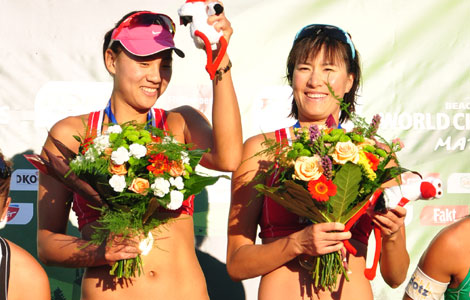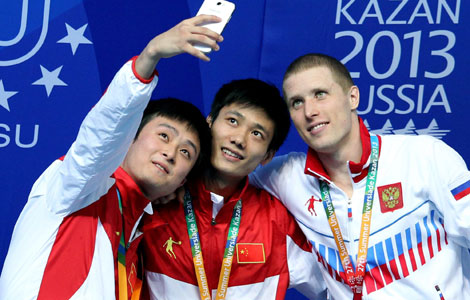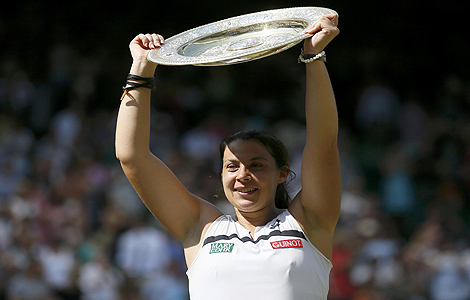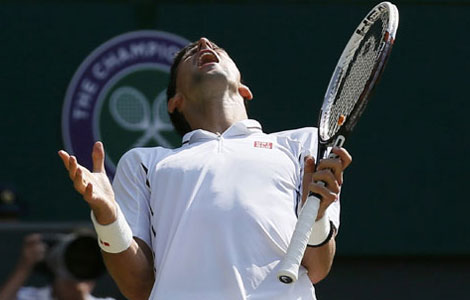

|
Britain's Andy Murray (left) embraces Novak Djokovic after defeating the Serb in the men's singles final at Wimbledon on Sunday. Anja Niedringhaus / Reuters / Pool |
Murray, Djokovic establishing new dominance on the court
Thanks for the memories Roger and Rafa, but it's the Novak and Andy show now.
Andy Murray's Wimbledon triumph on Sunday, when he beat Novak Djokovic 6-4, 7-5, 6-4 in the final, was Britain's first by a male player since Fred Perry in 1936.
But it also re-emphasized the new dominance at the Grand Slam level of the world's two top players, both aged 26 and born just five days apart.
Djokovic and Murray have now contested three of the past four Grand Slam finals.
Meanwhile, Roger Federer, the deposed champion of Wimbledon who was knocked out in the second round this time around, will find himself at No 5 in the world on Monday, his lowest ranking for over a decade.
Until he won his seventh Wimbledon 12 months ago, the 31-year-old had not won a major since the 2010 Australian Open, a 10-tournament gap at the majors.
Rafael Nadal, like Federer a former world No 1, was shocked in the first round at Wimbledon for his earliest exit at a major in 10 years as a professional.
The 27-year-old Spaniard, who was off the tour for seven months before his barnstorming return saw him capture a record eighth French Open, has not won a major away from Paris since the 2010 US Open.
In all, 33 of the past 34 Grand Slams have been won by Djokovic, Murray, Federer and Nadal, but seven of the past 11 have been taken by the world No 1 Serb and the world No 2 British player.
This year alone, Djokovic has won his fourth Australian Open, lost a tight five-setter to Nadal in the French Open semifinals before his runner-up spot to Murray at Wimbledon.
Murray was runner-up to Djokovic in Melbourne and skipped Paris because of a back injury. But Federer, holder of a record 17 majors, was a beaten semifinalist in Australia and a quarterfinalist at the French Open.
Nadal missed the Australian Open through injury and is under pressure never to play Wimbledon again to protect his increasingly troublesome knees.
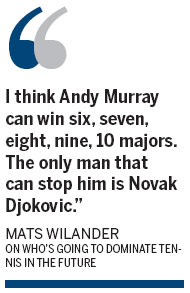
Mats Wilander, the Swedish star who won seven Grand Slam titles in the 1980s, believes Murray and Djokovic are now the undisputed superpowers of the sport.
"I think Andy Murray can win six, seven, eight, nine, 10 majors. The only man that can stop him is Novak Djokovic," said the Swede.
"These two are going to decide who gets ahead in the history books.
"I hope they both decide this is a rivalry that's just going to grow and become great on all the different surfaces, in all four majors."
Federer has seen his decision to slim down his schedule in 2013 backfire.
But he has surprised many by deciding to play two low-profile clay-court events before the American hard-court swing at Hamburg from July 15 and Gstaad the following week.
Having defeated just one top-10 player all year - Jo-Wilfried Tsonga at the Australian Open quarterfinals - Federer is desperate to bounce back from his Wimbledon misery, where he lost in the second round to Ukraine's 116-ranked Sergiy Stakhovsky in what was his worst Grand Slam defeat for a decade.
His shock Wimbledon loss ended a run of 36 consecutive Grand Slam quarterfinal appearances, having not exited a major before the last eight since the 2004 French Open.
Federer is adamant he will be back at Wimbledon next year, when he will be six weeks short of his 33rd birthday.
If he were to win a record eighth Wimbledon crown in 2014, he would become the oldest man to clinch the title, surpassing Arthur Ashe who was six days away from his 32nd birthday when he triumphed in 1975.
"I still have plans to play for many more years to come," said Federer.
Nadal had played 35 Grand Slams coming into Wimbledon this year without ever having lost in the first round.
But the tournament, part of just a four-week grass-court season, has always asked the most searching questions.
He did not play in 2004 or in 2009 when more knee trouble, which had contributed to his only career loss in Paris, forced him to tearfully give up on the defense of a title he had won for the first time in 2008.
Furthermore, his defeat to Lukas Rosol in the second round in 2012 meant he missed the Olympics, the US and Australian Opens.
Nadal refused to blame his knee for his defeat or even discuss his schedule for the rest of the year.
"This is sport, it's not a tragedy," he said.
"I am confident that I will have a good recovery and be ready for the next tournaments."
(China Daily 07/10/2013 page22)
